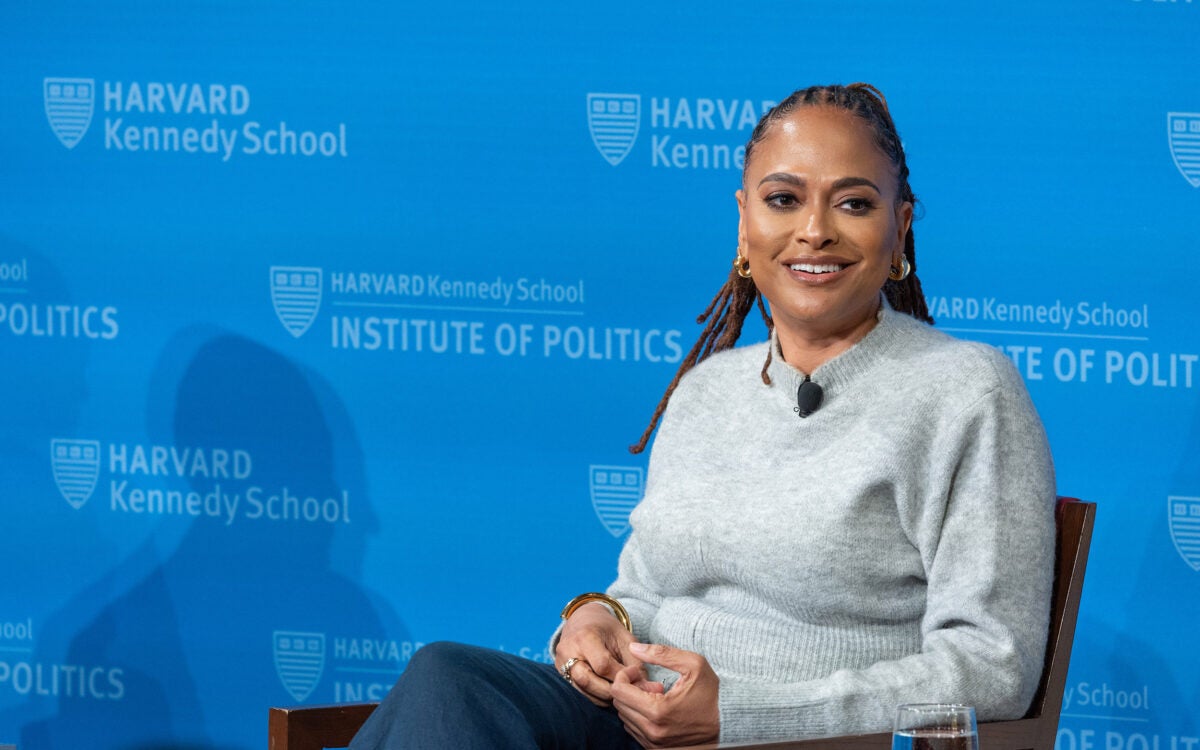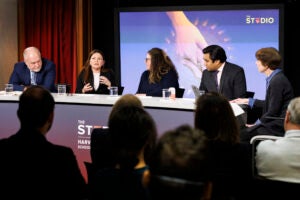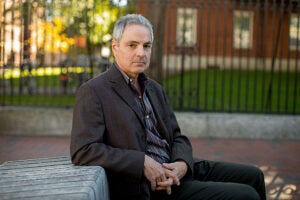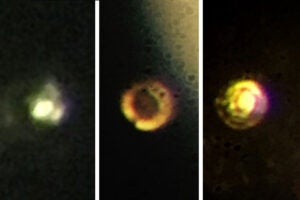Tag: Peter Reuell
-
Nation & World
Probing protein diversity
A team of researchers has found that the stability plays a key role in the evolution of different protein structures.
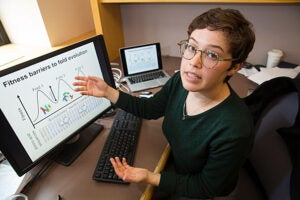
-
Nation & World
Inequality’s influence
A new study has found that, following momentary exposure to inequality, support for a “millionaire’s tax” dropped by more than 50 percent.

-
Nation & World
How the brain handles tools
A new study shows that, despite having no experience using tools with their hands, the brains of people born without hands represent tools and hands much the same as seen in the brains of people born with hands.

-
Nation & World
From drinking straws to robots
Inspired by arthropod insects and spiders, scientists George Whitesides and Alex Nemiroski have created a type of semi-soft robot capable of walking, using drinking straws, and inflatable tubing. The team was even able to create a robotic water strider capable of pushing itself along the water’s surface.
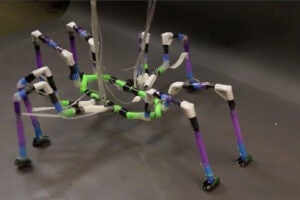
-
Nation & World
Inquiring minds rewarded
Ideas in language, health, and astronomy are winners in this year’s Star Family Challenge, a grant that funds high-risk, high-reward research.
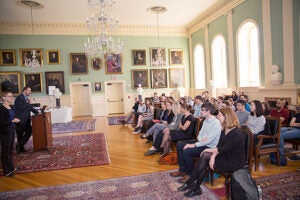
-
Nation & World
Figuring out superconductors
A team of physicists has taken a crucial step toward understanding superconductors by creating a quantum antiferromagnet from an ultracold gas of hundreds of lithium atoms.
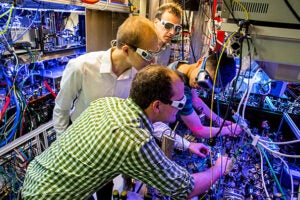
-
Nation & World
Sanes receives Gruber Neuroscience Prize
Joshua R. Sanes, the Jeff C. Tarr Professor of Molecular and Cellular Biology and founding director of the Center for Brain Science, has been named recipient of the 2017 Gruber Neuroscience Prize.
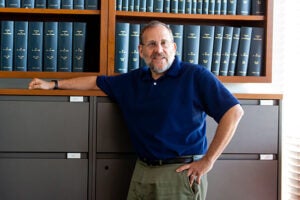
-
Nation & World
The power of picturing thoughts
A new Harvard study shows that people create visual images to accompany their inner speech even when they are prompted to use verbal thinking, suggesting that visual thinking is deeply ingrained in the human brain.
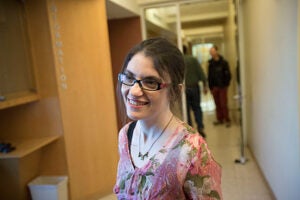
-
Nation & World
Me, steal? Impossible
New findings suggest a surprisingly common default in human behavior: the view that immoral actions are impossible.
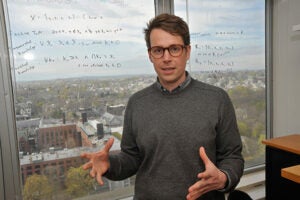
-
Nation & World
A hidden Declaration
A discovery of the Declaration in the south of England set a pair of researchers on a two-year journey into American history.

-
Nation & World
Mom, dad set in their ways? Maybe it’s not their fault
Research led by Hopi Hoekstra breaks new ground by uncovering links between the activity of specific genes and parenting differences across species
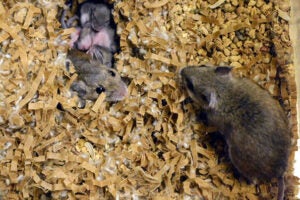
-
Nation & World
Dream journey
Varsha Varman is a step closer to reaching her goals thanks in part to financial aid from Harvard.

-
Nation & World
‘Innovative’ teaching is recognized
Professors Elena Kramer and Martin Nowak have been named the recipients of the 2016 Fannie Cox Prize for Excellence in Science Teaching.
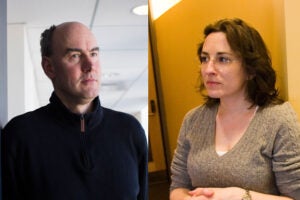
-
Nation & World
The machinery of hearing
New research not only sheds new light on how hearing works, but could help clarify how it deteriorates over time.
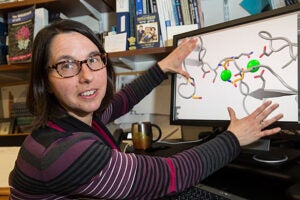
-
Nation & World
FAS staff acknowledged for their contributions
The dozens of FAS staff who gathered in University Hall on March 9 were honored as Dean’s Distinction award winners, with 59 recipients receiving a total of 61 awards.
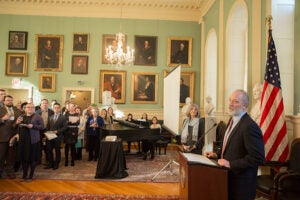
-
Nation & World
Why sing to baby? If you don’t, you’ll starve
A new study suggests that infant-directed song evolved as a way for parents to signal to children that their needs were being met, while leaving time for other tasks, like food foraging or caring for other offspring.
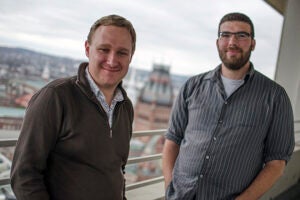
-
Nation & World
Making math more Lego-like
A trio of Harvard researchers has developed a new 3-D pictorial language for mathematics with potential as a tool across a wide spectrum, from pure math to physics.
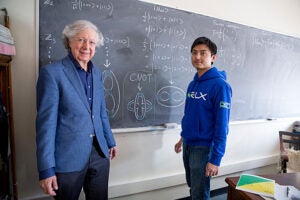
-
Nation & World
A mother’s influence
Researchers have shown, for the first time, that chimpanzees learn certain grooming behaviors from their mothers. Once learned, chimps continued to perform the behavior long after the deaths of their mothers.
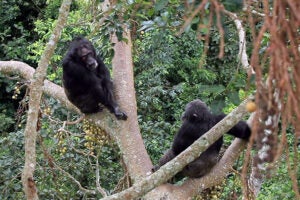
-
Nation & World
Gut details
New findings have the potential to help researchers more accurately identify microbiome enzymes and quantify their relative abundance.
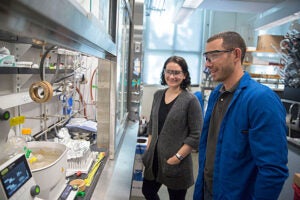
-
Nation & World
When bias hurts profits
Based on data collected from a French grocery store chain, a new Harvard study has found that minority workers were far less efficient in a handful of important metrics when working with biased managers.

-
Nation & World
Lab opens doors for an undergrad experience
As part of Harvard’s Wintersession, a handful of freshmen got the chance to experience the reality of lab work by exploring how altering genes in yeast affected the cells’ functions.
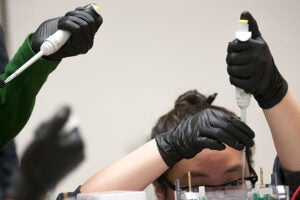
-
Nation & World
Catalyzing discovery
In a trio of studies published earlier this month, researchers have shown that the process of catalysis is more dynamic than previously imagined, and that molecular forces can vastly influence the process.
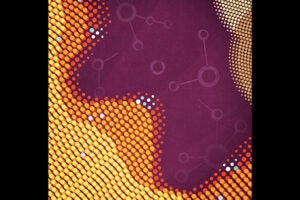
-
Nation & World
A revised portrait of psychopaths
A study suggests that while psychopaths do feel regret, however, it doesn’t affect their choices.

-
Nation & World
Recognition for their discoveries
Harvard physicists Cumrun Vafa and Andrew Strominger have been named winners of the 2017 Breakthrough Prize in Fundamental Physics in recognition of their groundbreaking work in a number of areas, including black hole theory, quantum gravity, and string theory.
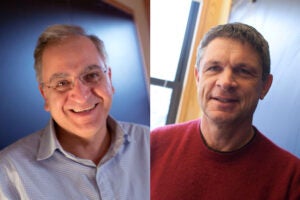
-
Nation & World
Spotting speedy brain activity
Using ultra-fast MRI scans, scientists are able to track rapid oscillations in brain activity that previously would have gone undetected, a development that could open the door to understanding fast-occurring cognitive processes that once appeared off-limits to scientists.
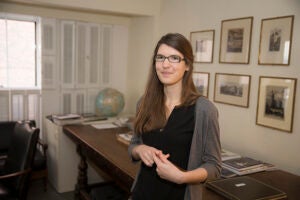
-
Nation & World
Diamonds are a lab’s best friend
Using the atomic-scale quantum defects in diamonds known as nitrogen-vacancy centers to detect the magnetic field generated by neural signals, scientists working in the lab of Ronald Walsworth, a faculty member in Harvard’s Center for Brain Science and Physics Department, demonstrated a noninvasive technique that can show the activity of neurons.
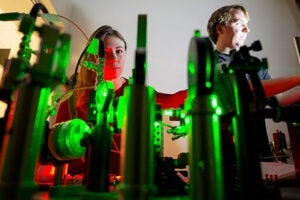
-
Nation & World
Harvard students, meet the Stone Age
Students taking part in a new freshman seminar class learn to appreciate the sophistication of Neanderthals by manufacturing their own stone tools from scratch.
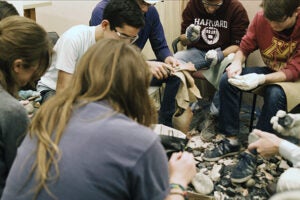
-
Nation & World
Two Harvard scholars headed across the pond
Two Harvard students were among those selected to receive prestigious Marshall Scholarships, which support up to two years of study in the United Kingdom.

